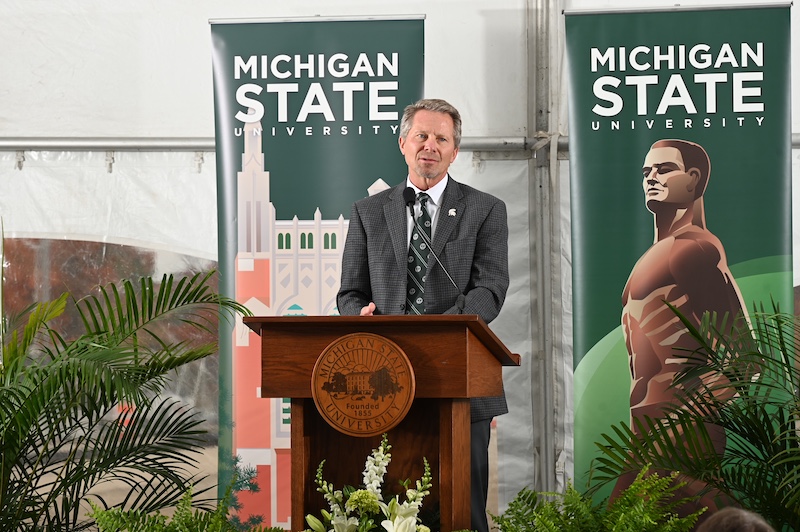A state-of-the-art Plant and Environmental Sciences Building is officially under construction, accelerating climate-critical discoveries and advancing Michigan State University’s excellence in food security.

“World-class science requires world-class facilities to support new discoveries,” said MSU President Kevin M. Guskiewicz, Ph.D. “With the investments we’re making in infrastructure, MSU has the opportunity to provide global solutions in plant and environmental science while significantly expanding our leadership.”
This fall, the MSU Board of Trustees gave its stamp of approval to the 200,000-square-foot facility located on the corner of Farm Lane and Wilson Road. When it’s finished, the new building will provide critical laboratory space for about 40 principal investigators and their teams.
At a groundbreaking ceremony, MSU officials said this new investment in infrastructure will solidify the university’s position as a top-ranking plant research institution.
“For over 160 years, MSU has been a leader in agricultural research and education, standing as the nation’s premier land-grant institution and a model for others,” MSU Trustee Kelly Tebay said. “Today, we honor that legacy by furthering our commitment to plant science and taking on big challenges such as the future of food security.”
The new building’s rooftop will feature the fourth phytotron in the U.S., regulating temperatures, humidity, light and carbon dioxide levels to simulate precise climate conditions. Inside the building will be the Center for Advanced Microscopy to support high-resolution plant visualizations and analysis, seed storage facilities to safeguard long-term plant biodiversity, and collaborative, flexible workspaces to facilitate interdisciplinary teamwork.

The Plant and Environmental Sciences Building, or PESB, will complement MSU’s plant and environmental science infrastructure, which currently includes the Plant Science Greenhouse complex, the Integrative Plant Sciences Building, the Plant Biology Laboratories, the Biochemistry Building, the Molecular Plant Sciences Building and the Plant and Soil Sciences Building.
Faculty members from the College of Natural Science and the College of Agriculture and Natural Resources will be housed in the building rather than spread across multiple buildings. Additionally, research teams from both the MSU-DOE Plant Research Laboratory, or PRL, and the Plant Resilience Institute, or PRI, will use the new building, aligning PRL’s strengths in plant biology and molecular genetics with PRI’s focus on the mechanisms of plant resilience aiding in developing plant and crop varieties that can withstand heightened environmental stress.
“We are focused on developing more resilient plants for a changing climate — plants that can withstand extreme heat, drought and pests,” said Doug Gage, MSU vice president for Research and Innovation. “Plant science excellence is a longstanding commitment here at MSU and has led to breakthrough discoveries and international recognition of our faculty.”
Construction of the $200 million project is expected to be completed by December 2026.